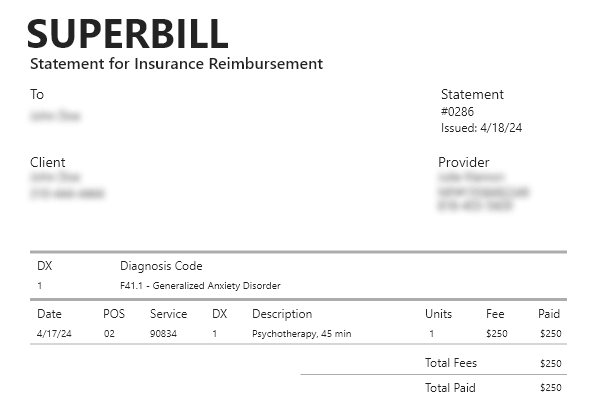Navigating mental health insurance coverage for therapy can be challenging, but understanding superbills and their role in the therapy reimbursement process can help you maximize your insurance coverage benefits. This article is a general guide to help you understand the basics of insurance benefits for therapy, superbills, and how to get the most out of your out-of-network therapist coverage.

A General Note on Mental Health Insurance Coverage
Every insurance plan is different, and it's essential to verify your specific mental health insurance coverage and benefits directly with your provider. Be sure to ask detailed questions about your plan, as coverage for mental health services, out-of-network therapist coverage, and reimbursement rates can vary significantly from one plan to another.
The information provided here is based on standard practices and should not be considered a substitute for the details of your specific mental health insurance coverage. Always consult your insurance provider and therapist to make informed decisions about your health care and financial responsibilities.
In-Network vs. Out-of-Network Providers
In-Network Providers
These are therapists or mental health professionals who have a contract with your insurance company. They have agreed to provide services at a discounted rate, and your insurance will typically cover a more significant portion of the cost.
Out-of-Network Providers
These are therapists or mental health professionals who do not have a contract with your insurance company. They may charge higher rates, and your insurance may cover a smaller portion of the cost or require you to pay a higher deductible for out-of-network therapist coverage.
It's crucial to understand that some insurance plans do not cover out-of-network providers at all. Check with your insurance provider to clarify your specific in-network and out-of-network therapist coverage.
Understanding Superbills for Therapy Reimbursement Process
What is a Superbill for Therapy?
A superbill is a detailed invoice that outlines the services you received from your therapist. It includes key information like your diagnosis and diagnosis code, service dates, therapy type, and fees. The diagnosis code helps your insurance company understand your mental health condition and the treatment necessary. This allows them to review the mental health insurance claims and potentially reimburse you for some or all of the session costs as part of the therapy reimbursement process.
How to Use a Superbill for Therapy Reimbursement Process
Before starting therapy, ask your mental health provider insurance these key questions:
- Out-of-Network Therapist Coverage: Do I have coverage for out-of-network therapist coverage from a Licensed Therapist?
- Out-of-Network Deductible: Is there a deductible that must be met? You'll pay this amount out-of-pocket before insurance kicks in.
- Covered Therapy Sessions: How many therapy sessions per year are covered? Plans often have annual limits.
- Referral Requirement: Do I need a referral from my primary care physician to see an out-of-network mental health provider?
Once you have these answers, you can decide if using your out-of-network therapist coverage is right for you. If so, your therapist can provide you with a superbill to submit to your insurance for potential reimbursement as part of the therapy reimbursement process.
Superbill Submission Guidelines for Mental Health Insurance Claims
Submitting a superbill for mental health insurance claims is straightforward:
- Contact your mental health provider insurance's member services to ask about their superbill submission guidelines.
- Follow their instructions carefully for a smooth therapy reimbursement process.
- Keep copies of superbills and insurance correspondence for your records to stay organized and simplify follow-ups on any issues related to your mental health insurance claims.
Maximizing Therapy Benefits with Behavioral Health Coverage
With a little effort, you can maximize your behavioral health coverage and make mental health care more affordable. Don't hesitate to ask your therapist or insurance company if you have additional questions about using superbills for private practice mental health reimbursement or your specific insurance benefits for therapy!